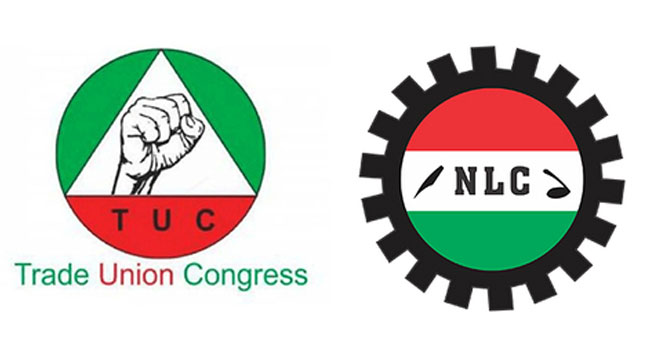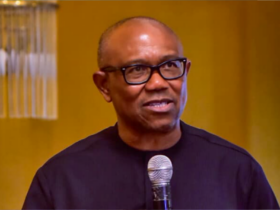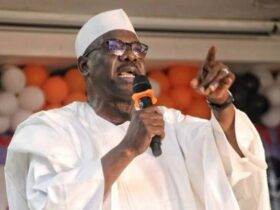
The Nigerian Labour Congress announced on Tuesday that the previously proposed N200,000 minimum wage to the Federal Government is no longer feasible given the nation’s present economic circumstances.
Speaking through its National Vice President, Tommy Etim, the Congress responded to Kashim Shettima’s inauguration of the Minimum Wage Committee on Tuesday.
In an exclusive interview with The Punch, Etim underscored that the Congress intends to align its national minimum wage negotiation with the prevailing economic conditions rather than its initial proposal.
He said, “You are aware that when we opted for the N200,000, the socio-economic challenges were not as biting as they are now. And when you now look at the exchange rate, it was not what it is now. The naira rate not been devalued as it is now. So, N200,000 is no longer tenable.”
When asked about a minimum figure for the congress to bring to the committee, Etim stated, “We aren’t setting a fixed amount, but certainly not less than N200,000. We’ll determine based on the socio-economic context when we convene. That will guide our discussions and negotiations on the national minimum wage.”
READ ALSO: Anticipate New Minimum Wage in March, NLC Notifies Workers
The Federal Government had earlier urged the 37-member wage committee to expedite deliberations and promptly submit recommendations. It directed the Ministry of Finance to ensure adequate funding and called for genuine collective bargaining, stressing contract adherence. Committee members were encouraged to seek external input.
Comprising representatives from federal and state governments, the private sector, and organized labor, the panel is tasked with proposing a new national minimum wage.
In emphasizing the importance of sustainability across government levels, President Bola Tinubu stressed that the committee must assess the financial capacity of all stakeholders to meet the new wage requirements.
He also urged committee members to prioritize the timely completion of their tasks.
Tinubu’s remarks were conveyed by the Vice President during the inauguration of the tripartite committee on the national minimum wage at the Council Chamber of the State House in Abuja.
“The committee is anticipated to conclude its deliberations promptly and submit its report and recommendations.
“This timely submission is crucial to initiate the necessary processes for implementing a new National Minimum Wage.
“The Honourable Minister of Finance and Coordinating Minister of the Economy has been instructed to allocate the essential funds and logistics to the Committee, facilitating the timely completion of its assigned task. I hereby inaugurate the Tripartite Committee on National Minimum Wage and extend my best wishes for fruitful deliberations,” declared the President.
Following months of persistent pressure from organized labor, Tuesday’s inauguration marks the culmination of their agitation regarding the Federal Government’s failure to establish the new national minimum wage committee, as promised during negotiations last October.
In May 2017, the House of Representatives initiated a move to amend the National Minimum Wage Act, proposing a mandatory review of workers’ remuneration every five years.
This initiative led to the enactment of the Minimum Wage Act 2019, signed by former President Muhammadu Buhari, which empowered the committee to engage in deliberations and propose a mutually agreed-upon wage for ratification by the National Assembly, subject to legislative scrutiny.
In the same year, Buhari also signed into law the Minimum Wage Act, which approved a minimum wage of N30,000 for both federal and state workers.
However, the announcement by Tinubu of the discontinuation of fuel subsidies on May 29, 2023, precipitated a significant increase in the overall cost of living.
Despite the administration’s approval of an additional N35,000 wage increment for a six-month period starting September 2023, aimed at mitigating the impact of subsidy removal, organized labor insisted that this was merely a temporary measure and called for a comprehensive review of the minimum wage in 2024.
The President expressed his administration’s aspiration to exceed the basic Social Protection Floor for all Nigerian workers, taking into account the sustainable payment capacity of each level of government and other employers or businesses.
He explained why: “I express this viewpoint because the minimum wage represents the least amount of compensation an employee should receive for their labour, and as such, it should be rooted in social justice and equity.”
“I hope that the results of your deliberations will be consensual and acceptable to all parties involved,” the President told members of the committee.
Following months of persistent pressure from organized labor, Tuesday’s inauguration marks the culmination of their agitation regarding the Federal Government’s failure to establish the new national minimum wage committee, as promised during negotiations last October.
In May 2017, the House of Representatives initiated a move to amend the National Minimum Wage Act, proposing a mandatory review of workers’ remuneration every five years.
This initiative led to the enactment of the Minimum Wage Act 2019, signed by former President Muhammadu Buhari, which empowered the committee to engage in deliberations and propose a mutually agreed-upon wage for ratification by the National Assembly, subject to legislative scrutiny.
In the same year, Buhari also signed into law the Minimum Wage Act, which approved a minimum wage of N30,000 for both federal and state workers.
However, the announcement by Tinubu of the discontinuation of fuel subsidies on May 29, 2023, precipitated a significant increase in the overall cost of living.
Despite the administration’s approval of an additional N35,000 wage increment for a six-month period starting September 2023, aimed at mitigating the impact of subsidy removal, organized labor insisted that this was merely a temporary measure and called for a comprehensive review of the minimum wage in 2024.
The President expressed his administration’s aspiration to exceed the basic Social Protection Floor for all Nigerian workers, taking into account the sustainable payment capacity of each level of government and other employers or businesses.








Leave a Reply